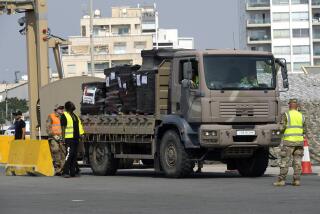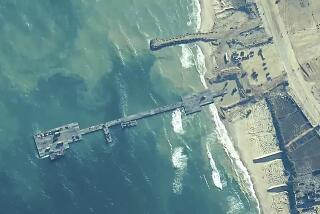Gun Prices Fall as Somalis Wait for U.S. Troops
MOGADISHU, Somalia — The price of machine guns plummeted Monday, and the broken dirt tracks leading out of this devastated capital were filled with dozens of “Mad Max” jeeps, bristling with antiaircraft weapons and armed teen-agers in T-shirts, as one of the globe’s most impoverished, anarchic spots prepared for the arrival of order.
Less than 48 hours before the expected dawn landing of up to 1,800 U.S. Marines on Mogadishu’s beachheads, two U.S. F-14 fighter jets buzzed here just before noon, dropping flares on the airport in a gesture seen by many as a herald of peace and others as a warning of what could become a new and very different war.
A few young, armed Somalis--in streets that have no electricity, no water, no signs and thousands of little trees cracking their way through forgotten concrete--did speak with some pride about the prospect of being disarmed by a force as powerful as the U.S. Marines.
“Welcome,” one teen-ager said, waving his AK-47 assault rifle. “Welcome to it. I will be happy to give it to the U.S. Marines.”
But in their routine radio broadcasts, the Somali warlords, who have chopped up the capital into blocks of power and carved the starving countryside into enclaves of armed clans, stopped short of making such offers; they repeated their promises of “full cooperation” with the American military force and the United Nations, which sanctioned the unprecedented humanitarian operation here.
As some analysts here speculated that the American military will view the warlords not as part of the Somali solution but as the problem itself, Robert Oakley, the former U.S. ambassador to Somalia and President Bush’s special envoy to this embattled land, arrived.
He immediately launched a series of meetings with Somali clan leaders, former government officials and members of the international aid community, who have struggled for almost two years to save Somalia from its own destruction.
“This is a humanitarian operation, not a military operation,” Oakley told a news conference. “This is the opposite of Desert Storm (the Persian Gulf War effort). We hope it will remain that way throughout because it is the intention to deliver relief supplies.”
In the meetings, most of the relief agencies--which have functioned here only by employing vast, heavily armed security forces they call “technicals”--expressed deep concern that the planned American military operation remains fraught with potential dangers.
Several said that U.S. miliary planners still have given them no operational guidelines on how to function when the troops arrive--within a matter of hours.
“We expressed concerns about how we manage our own security at the moment,” said Mark Stirling, UNICEF’s representative in Somalia. He spoke during a generator-powered news briefing after the meeting between Oakley and relief officials.
Stirling said the American military force--whose principal mission is to safeguard the huge relief stockpiles from the looting that has kept them from Somalia’s starving millions--will succeed only if it manages to rebuild the confidence of Somalis in this tattered nation’s cities and towns; they now house hundreds of thousands of villagers displaced during internecine fighting.
Stirling said his and other relief agencies, working only with the protection of costly fleets of armed jeeps and thousands of hired guns, have made some progress in getting food to the people in recent months. But he conceded that much more is necessary.
“The problem is, it is unsustainable. It is extremely fragile,” he said of the relief effort. And he, like most of the aid officials who have labored to distribute relief to the estimated 2 million starving Somalis throughout this country, concluded that “of course, the world waited far too long.”
Speaking as much to the arriving Marines as to the army of international journalists who have flooded a city stripped bare of even the last traces of civilization, Stirling added: “It was all far too little, far too late.”
Indeed, another Western analyst in Mogadishu observed that “the three ways to make a living on the Somali economy today are as a looter, a hired gun or a drug dealer.”
It is against this backdrop that the world will view this week’s Marine landing on a quiet beachhead near Mogadishu’s downtown airport; an improvised network of satellite dishes and high-tech equipment already has poured into the capital in anticipation of the Marines’ arrival. The gear has been remarkably free from the looting that victimized the food shipments destined for the Somali masses.
Veteran Somali analysts said the warlords and major looters appear to have backed off in recent days. Petty looting has escalated, fueled by the imminent arrival of a strange new era of law and order.
And there were reports of a second day of clan fighting in the famine center of Baidoa, about 160 miles northwest of here; the fighting is said to have resulted in 48 deaths and 50 wounded, many of them Somalis caught in a cross-fire at a market in the center of town.
More than 24 people were killed Sunday, when the fight began. Relief sources said the conflict arose when a group of looters entered Baidoa from a nearby town and were challenged by local clan members.
“They’ve now gone back to their town after having raised hell for two days,” said one source.
The carnage quickly overwhelmed the only local medical facility, a hospital operated by the Los Angeles-based International Medical Corps, which has eight doctors remaining at work in the town. At least 25 victims were being treated at the hospital.
Still, officials of the relief agency CARE, which attempts to distribute most of the U.N. food aid, said they managed to free 800 tons more of flour, sorghum and maize from Mogadishu’s warlord-controlled port on Monday.
Greeting a chartered aircraft carrying half a dozen Western journalists Monday at a simple, gravel landing strip known as K-50 Airport (named for its location, 50 kilometers outside the city), an elder Somali with broken teeth in a tattered robe approached and identified himself as, “Abu Wahid, chief of security of this airport.
“Do you need transportation to Mogadishu?” Wahid asked.
When pressed, he suddenly produced a Land Rover and declared, “Of course, I can assure you of your safety. You are welcome. You are perfectly safe.
“But these two men,” he added, pointing to two teen-agers with old assault rifles clamoring up the back of the jeep, “they will ride on the roof. This is your security.”
And, as night fell over Mogadishu, occasional gunfire could be heard--but far less than has been the norm in the time before the world was watching.
* HELPING SOMALIA: A list of charitable organizations accepting donations. B2
BACKGROUND
When relief workers in Somalia refer to “technicals,” they are not describing basketball fouls. That is their description for a type of a vehicle and the heavily armed security forces they have been forced to retain in bandit-ridden Somalia. “Technicals” are not only trucks and jeeps laden with heavy weapons like the vehicles depicted in the “Road Warrior” and “Mad Max” movies featuring actor Mel Gibson; the term also has been used for the often ragtag forces that ride such vehicles and are hired as “security forces.”
More to Read
Sign up for Essential California
The most important California stories and recommendations in your inbox every morning.
You may occasionally receive promotional content from the Los Angeles Times.










